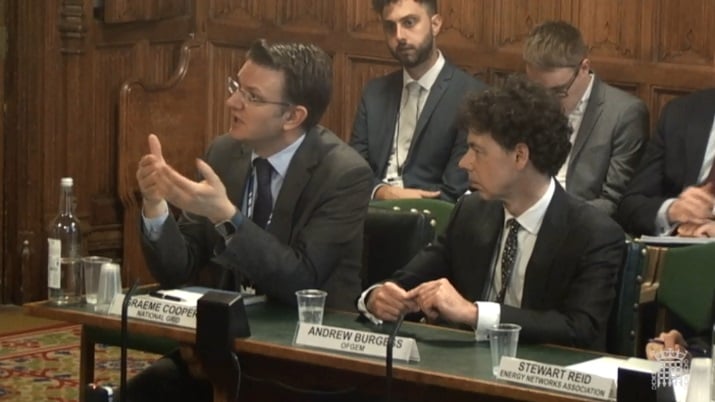Ofgem’s price controls are proving a barrier to the ‘targeted intervention’ needed to deploy a national network of ultra-rapid electric vehicle (EV) chargers and solve range anxiety, according to National Grid’s project lead on EVs.
This morning saw Graeme Cooper address the business, energy and industrial strategy (BEIS) select committee in Parliament alongside Andrew Burgess, associate partner for energy systems integration at Ofgem, and Stewart Reid, chair of the Energy Networks Association Low Carbon Technologies Working Group.
During the wide-ranging discussion, MPs turned to the impact of EVs on the need for infrastructure upgrades to accommodate any increased demand for capacity. Cooper replied that there was “enough capacity on the transmission system… to not have to do any significant upgrades for the reasonably foreseeable future”.
However, he went on to discuss how specific areas of EV charging to overcome range anxiety – specifically at motorway services – would need specific attention within a RIIO framework which may not allow for such action.
“If you had the comfort that you could travel 50 miles in any direction and get an ultra-rapid charger…the problem disappears. The challenge for that though, and really where to some extent we need an intervention, is that someone needs to fix the country as a whole,” he said.
“We can deliver the capacity at motorway service stations to serve the replacement of petrol stations…but that needs specific intervention to unlock the perception of range anxiety and the uptake of cars.
“The RIIO process [is] an excellent process that’s delivered, at least from a National Grid point of view, over £460 million worth in savings so it’s great for the consumer. The challenge is that it works great [in] business as usual steps; the challenge we have in the motorway services area as an example is a little bit of targeted intervention is a market disruptor and doesn’t fit within the normal framework.”
The reason for this is down to the cost of such work, which under Cooper’s scenario would likely be met by network companies, the cost of which would be “smeared across all energy consumers”. This would affect the energy bills of both EV drivers and those without the vehicles, accepted by Cooper and Burgess as a cost that would not be fairly allocated.
“There needs to be a fair distribution of costs…Those that impose an extra cost should bare a fair proportion of that…and not have consumers who don’t have electric vehicles unduly subsidising those that do,” Burgess said.
Previously, Cooper has said the cost of 50 ultra-rapid charger locations placed strategically across the country could be delivered for as little as £0.60 a car per year if the cost were somehow targeted at road users.
Today he reiterated that there were “other ways of slicing and dicing” this cost towards drivers but that this investment would be “difficult” to get co-ordinated within the current price controls.
“If you lumped all the cost onto the person charging you’d stall the market so to an extent we need to keep going on the RIIO price control…but I do think some considered targeted intervention [is needed] if you want to generally move us more quickly to overcoming that range anxiety, which is one of the biggest reasons for not buying an EV, and therefore taking a step forward to decarbonising transport more quickly,” Cooper added.
Burgess conceded that some expense may be expected from consumers to fund the motorway charging points but that the ‘connecting parties’ would likely pay a significant portion of the cost, which in rural locations are usually expensive.
“Where there are particular challenges towards motorways, I think it’s getting the balance right between the connecting parties, so whoever is driving the change, and consumers in general.
“But we think it’s wrong for everything to be loaded on consumers because it just goes on bills. Some of the reinforcement will go on bills but the connecting parties need to pay their share as well,” he said.






